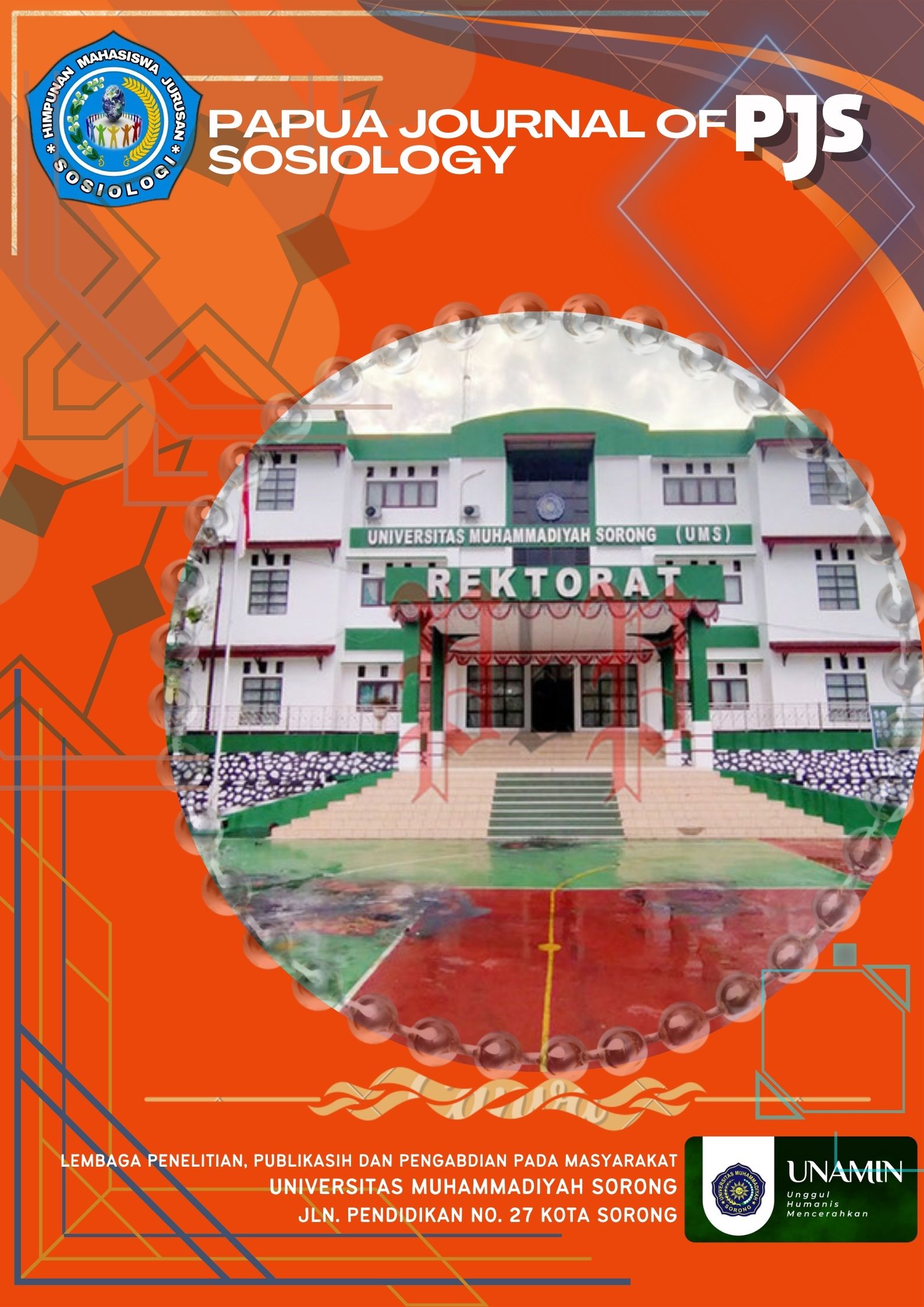Kajian Literatur Konsep Pembangunan Inklusif dalam Masyarakat Multikultural
DOI:
https://doi.org/10.33506/pjs.v3i1.4735Keywords:
Development Concept; Inclusive; Multicultural SocietyAbstract
This study aims to explore the concept of inclusive development in a multicultural society, which is a major challenge in creating social welfare amidst cultural, ethnic, and religious differences. The main problem faced is how to ensure that all groups in society, including the marginalized, can enjoy the results of development fairly and evenly. This study uses a qualitative method with a literature review approach, utilizing secondary sources from scientific journals, books, websites and other sources that can be utilized for the problems studied that lead to the concept of inclusive development in a multicultural society. The results of the study show that inclusive development does not only focus on economic aspects, but also on fulfilling social and cultural rights, strengthening mutual respect between groups, and providing equal access to education, health, and employment opportunities. In addition, community involvement in the development decision-making process is key to creating sustainable, equitable development. In conclusion, inclusive development in a multicultural society requires an approach based on respect for diversity, collaboration between groups, and policies that encourage active participation from all levels of society without exception. This is important to create a just, prosperous, and harmonious society.
References
Alkire, S. (2002). Dimensions of human development. World development, 30(2), 181-205.
Banks, J. A. (2015). Cultural diversity and education: Foundations, curriculum, and teaching. Routledge.
Banks, J. A., & Diem, N. (2008). Diversity and citizenship education. Handbook of research in social studies education, 137-154.
Baumann, F. (2021). The next frontier—human development and the anthropocene: UNDP human development report 2020. Environment: Science and Policy for Sustainable Development, 63(3), 34-40.
Bertrand, J. (2004). Nationalism and ethnic conflict in Indonesia. Cambridge University Press.
Booth, A., Martyn-St James, M., Clowes, M., & Sutton, A. (2021). Systematic approaches to a successful literature review.
Cerra, V. (2022). An inclusive growth framework. How to achieve inclusive growth, 1-31.
Chaudhry, S. (2022). The assault on civil society: Explaining state crackdown on NGOs. International Organization, 76(3), 549-590.
Cypher, J. M. (2014). The process of economic development. Routledge.
EDuCatIon, C. (2010). Diversity, group identity, and citizenship education in a global age diversity. Democracy and multicultural education, 15.
Fortier, A. M. (2021). The becoming citizen. In Uncertain citizenship (pp. 161-201). Manchester University Press.
Fraser, N. (2009). Scales of justice: Reimagining political space in a globalizing world (Vol. 31). Columbia university press.
Fraser, N., & Honneth, A. (2003). Redistribution or recognition?: a political-philosophical exchange. verso.
Gasper, D. (2022). Rethinking human development and/as human security for the anthropocene: An analysis of the United Nations development programme trilogy of reports 2020–2022. The International Journal of Social Quality, 12(2), 1-24.
Hardiansah, E. C. (2015). Pengantar edisi khusus 55 tahun pendidikan planologi: Pembangunan kota inklusif di era desentralisasi. Jurnal Perencanaan Wilayah dan Kota, 26(1), 1-6.
Hastuti, D. R., Pramana, R. P., & Sadaly, H. Kendala Mewujudkan Pembangunan Inklusif terhadap Penyandang Disabilitas [Internet]. 2020. 61 p.
Hickey, S., & Du Toit, A. (2013). Adverse incorporation, social exclusion, and chronic poverty. In Chronic poverty: Concepts, causes and policy (pp. 134-159). London: Palgrave Macmillan UK.
Juditha, C. (2015). Stereotip dan Prasangka dalam Konfl ik Etnis Tionghoa dan Bugis Makassar. Jurnal Ilmu Komunikasi, 12(1).
Kabeer, N. (2010). Can the MDGs provide a pathway to social justice?: The challenge of intersecting inequalities. Brighton: Institute of Development Studies.
Kabeer, N. (Ed.). (2005). Inclusive citizenship: Meanings and expressions (Vol. 1). Zed Books.
Khan, A. W. (2008). Media education, a crucial issue in the building of an inclusive knowledge society. Empowerment through media education, 15-18.
Koentjaraningrat, K. (2009). Pengantar ilmu antropologi, edisi revisi PT. Rineka Cipta: Jakarta, 144.
Kuswandi, A. (2011). Desentralisasi pendidikan dalam penyelenggaraan otonomi daerah di Indonesia. governance, 2(1), 69-98.
Kymlicka, W. (2007). Multicultural odysseys. ethnopolitics, 6(4), 585-597.
Maritza, D. F., & Taufiqurokhman, T. (2024). Peranan masyarakat sipil dalam peningkatan akuntabilitas birokrasi melalui pengawasan publik yang aktif. Jurnal Ilmiah Ilmu Administrasi, 14(1), 71-84.
Modood, T. (2013). Multiculturalism. John Wiley & Sons.
Nadhiroh, U., & Ahmadi, A. (2024). Pendidikan inklusif: membangun lingkungan pembelajaran yang mendukung kesetaraan dan kearifan budaya. Ilmu Budaya: Jurnal Bahasa, Sastra, Seni, Dan Budaya, 8(1), 11-22.
Nasional, B. P. P. (2014). Rencana pembangunan jangka menengah nasional (RPJMN) 2015-2019.
Nasional, B. P. P. (2020). Rencana Pembangunan Jangka Menengah Nasional (RPJMN) 2020-2024. BAPENAS. Jakarta.
Negretto, G. L. (2021). Deepening democracy? Promises and challenges of Chile’s road to a new constitution. Hague Journal on the Rule of Law, 13(2), 335-358.
Nieto, S. (2010). Language, diversity, and learning: Lessons for education in the 21st century. Retrieved September, 30, 2012.
Nussbaum, M. C. (2011). Creating capabilities: The human development approach. Harvard University Press.
Parekh, B. (2001). Rethinking multiculturalism: Cultural diversity and political theory. Ethnicities, 1(1), 109-115.
Sachs, J. D. (2015). The age of sustainable development. Columbia University Press.
Sen, G. (2019). Gender equality and women's empowerment: Feminist mobilization for the SDG s. Global Policy, 10, 28-38.
Stiglitz, J. E. (2012). The price of inequality: How today's divided society endangers our future. WW Norton & Company.
Stuart, E., & Samman, E. (2017). Defining ‘leave no one behind’. ODI Briefing Note. London: Overseas Development Institute.
Todaro, Michael P. & Smith, Stephen C. (2020). Economic Development Economic Development
Triandafyllidou, A. (2013). Tolerance, Pluralism and Social Cohesion: Responding to the Challenges of the 21st Century in Europe.
Undp, A. (2016). Africa human development report 2016 accelerating gender equality and women’s empowerment in Africa (No. 267638). United Nations Development Programme (UNDP).
Union, I. P. United Nations Development Programme (UNDP)(2012). Global parliamentary report: The changing nature of parliamentary representation.
Vandemoortele, J. (2002). Are the MDGs feasible?. Targeting Development: Critical Perspectives on the Millennium Development Goals and International Development Targets. London: Routledge.
Watt, S. K. (2023). Multicultural initiatives as a practice of freedom. In Designing Transformative Multicultural Initiatives (pp. 11-22). Routledge.
World Bank. (2025). World Development Report: Social Inclusion. Washington DC: WB.
Ydo, Y. (2020). Inclusive education: Global priority, collective responsibility. Prospects, 49(3), 97-101.






